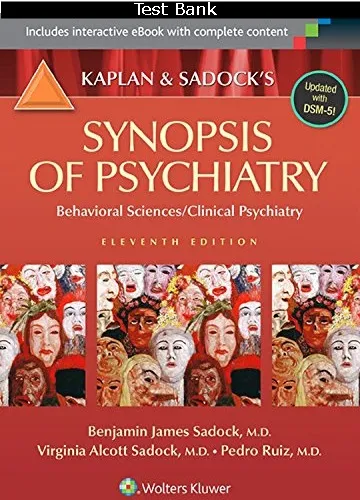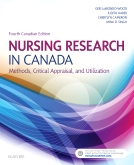Kaplan and Sadock’s Synopsis of Psychiatry: Behavioral Sciences/Clinical Psychiatry 11th Ed. Test banks
$55.00 Original price was: $55.00.$25.00Current price is: $25.00.
Digital item No Waiting Time Instant Download
Chapters: 37
Format: PDF
ISBN-13: 978-1609139711
ISBN-10: 1609139712
Publisher: LWW; Eleventh edition
Authors: Benjamin J. Sadock, Virginia A.
Sadock, Dr. Pedro Ruiz
Description
Kaplan and Sadock’s Synopsis of Psychiatry: Behavioral Sciences/Clinical Psychiatry 11th Ed. Test banks
Table of Contents
Chapter 1: Neural Sciences
Chapter 2: Contributions
Chapter 3: Contributions
Chapter 4: Theories
Chapter 5: Examination and
Chapter 6: Classification in Psychiatry
Chapter 7: Schizophrenia Spectrum and Other Psychotic Disorders
Chapter 8: Mood Disorders
Chapter 9: Anxiety Disorders
Chapter 10: Obsessive-Compulsive and Related Disorders
Chapter 11: Trauma- and Stressor-Related Disorders
Chapter 12: Dissociative Disorders
Chapter 13: Psychosomatic Medicine
Chapter 14: Chronic Fatigue Syndrome and Fibromyalgia
Chapter 15: Feeding and Eating Disorders
Chapter 16: Normal Sleep and Sleep-Wake Disorders
Chapter 18: Gender Dysphoria
Chapter 19: Disruptive, Impulse Control, and Conduct Disorders
Chapter 20: Substance Use and Addictive Disorders
Chapter 21: Neurocognitive Disorders
Chapter 22: Personality Disorders
Chapter 23: Emergency Psychiatric Medicine
Chapter 24: Complementary and Alternative Medicine in Psychiatry
Chapter 25: Other Conditions that May be a Focus of Clinical Attention
Chapter 26: Physical and Sexual Abuse of Adults
Chapter 27: Psychiatry and Reproductive Medicine
Chapter 28: Psychotherapies
Chapter 29: Psychopharmacological Treatment
Chapter 32: Adulthood
Chapter 33: Geriatric Psychiatry
Chapter 34: End of Life Issues
Chapter 35: Public Psychiatry
Chapter 36: Forensic Psychiatry and Ethics in Psychiatry
Chapter 37: World Aspects of Psychiatry
Kaplan and Sadock’s Synopsis of Psychiatry 11th edition TESTBANK
Chapter 1: Neural Sciences
Test Bank
MULTIPLE CHOICE
1. A patient with depression mentions to the nurse, My mother says depression is a chemical
disorder. What does she mean? The nurses response is based on the theory that depression
primarily involves which of the following neurotransmitters?
a. Cortisol and GABA
b. COMT and glutamate
c. Monamine and glycine
d. Serotonin and norepinephrine
ANS: D
One possible cause of depression is thought to involve one or more neurotransmitters. Serotonin
and norepinephrine have been found to be important in the regulation of depression. There is no
research to support that the other options play a significant role in the development of
depression.
2. A patient has experienced a stroke (cerebral vascular accident) that has resulted in damage to
the Broca area. Which evaluation does the nurse conduct to reinforce this diagnosis?
a. Observing the patient pick up a spoon
b. Asking the patient to recite the alphabet
c. Monitoring the patients blood pressure
d. Comparing the patients grip strength in both hands
ANS: B
Accidents or strokes that damage Brocas area may result in the inability to speak (i.e., motor
aphasia). Fine motor skills, blood pressure control, and muscle strength are not controlled by the
Broca area of the left frontal lobe.
3. The patient diagnosed with schizophrenia asks why psychotropic medications are always
prescribed by the doctor. The nurses answer will be based on information that the therapeutic
action of psychotropic drugs is the result of their effect on:
a. The temporal lobe; especially Wernickes area
b. Dendrites and their ability to transmit electrical impulses
c. The regulation of neurotransmitters especially dopamine
d. The peripheral nervous system sensitivity to the psychotropic medications
ANS: C
Medications used to treat psychiatric disorders operate in and around the synaptic cleft and have
action at the neurotransmitter level, especially in the case of schizophrenia, on dopamine. The
Wernickes area, dendrite function, or the sensitivity of the peripheral nervous system are not
relevant to either schizophrenia or psychotropic medications.
4. A student nurse mutters that it seems entirely unnecessary to have to struggle with
understanding the anatomy and physiology of the neurologic system. The mentor would base a
response on the understanding that it is:
a. Necessary but generally for psychiatric nurses who focus primarily on
behavioral interventions
b. A complex undertaking that advance practice psychiatric nurses frequently use
in their practice
c. Important primarily for the nursing assessment of patients with brain
traumacaused cognitive symptoms
d. Necessary for planning psychiatric care for all patients especially those
experiencing psychiatric disorders
ANS: D
Nurses must understand that many symptoms of psychiatric disorders have a neurologic basis,
although the symptoms are manifested behaviorally. This understanding facilitates effective care
planning. The foundation of knowledge is not used exclusively by advanced practice psychiatric
nurses nor is it relevant for only behavior therapies or brain trauma since dealing with the results
of normal and abnormal brain function is a responsibility of all nurses providing all types of care
to the psychiatric patient.
5. A patient asks the nurse, My wife has breast cancer. Could it be caused by her chronic
depression? Which response is supported by research data?
a. Too much stress has been proven to cause all kinds of cancer.
b. There have been no research studies done on stress and disease yet.
c. Stress does cause the release of factors that suppress the immune system.
d. There appears to be little connection between stress and diseases of the body
ANS: C
Research indicates that stress causes a release of corticotropin-releasing factors that suppress the
immune system. Studies indicate that psychiatric disorders such as mood disorders are
sometimes associated with decreased functioning of the immune system. Research does not
support a connection between many cancers and stress. There is a significant amount of research
about stress and the body. Research has shown that there are some connections between stress
and physical disease.
6. A patient who has a parietal lobe injury is being evaluated for psychiatric rehabilitation needs.
Of the aspects of functioning listed, which will the nurse identify as a focus of nursing
intervention?
a. Expression of emotion
b. Detecting auditory stimuli
c. Receiving visual images
d. Processing associations





Be the first to review “Kaplan and Sadock’s Synopsis of Psychiatry: Behavioral Sciences/Clinical Psychiatry 11th Ed. Test banks”